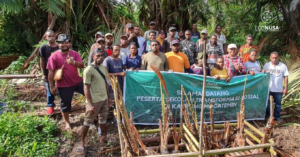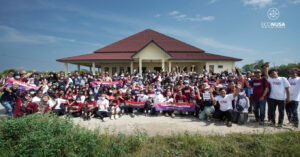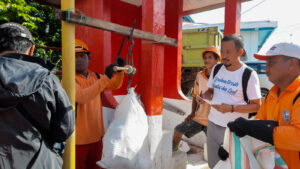
Welcome 2021. Pandemic has yet to see any change if compared to that of the last year. But glancing at the bygone helps us ponder on our hope for an equal and sustainable management of natural resources.
The 2020 has changed all the plans and made us take a deep breath. Last year went by more ‘quickly’. Without disregarding all the endeavors that have been made, it seems normal life only happened for the first 3 months in 2020, when the outbreak had not happened yet in Indonesia. We spent the rest by self-adjustment to health protocol due to Covid-19 pandemic.
In the early pandemic, people changed their behavior to curb the transmission. Most people stayed at home. Office building and thoroughfare became tranquil. The economic slowdown has made people worried. But at the same time, the amount of pollutant in the earth is declining.
Pollutant Drop
Not only in Indonesia, in many places in the world nitrogen dioxide and other pollutants also decreased. The Meteorology, Climatology and Geophysics Agency (BMKG) recorded the air quality in March 2020 was better than the previous year. A viral image on social media depicts obviously the comparation of Jakarta air before and early pandemic.
Most of us hails the clean air as a ‘blessing’ and ‘message’ which makes the earth take a break. We have spent prolonging poor air quality due to dirty energy. On the other hand, renewable energy remains less prioritized. Fossil-based resources are still the primadona for the policy maker to meet industrial and community needs.
Unfortunately, air quality change happens due to temporary behavioral change through coercive mechanism, instead of green economy with planned policy. When the large-scale social restriction (PSBB) was softened, vehicles flock the highways. Energy consumption during staying at home has increased. The sky in major city gets darker again.
Gavin Schmidt, climate scientist and Director of Nasa Goddard Institute for Space Studies, gave an appealing analogy. He considers the earth as if a bathtub continuously filled by carbon dioxide emission and pollutant. After a while, the temporary halt of carbon dioxide and pollutant fill does not give any significant effect. “It remains full even if it is downsized,” he said.
Forest Degradation
Indonesian economy that relies on the consumption of upper middle-income class could hardly bear the ordeal during the pandemic. Unemployment rate rises by 2.67 million people as from 7.1 million into 9.77 million. The mounting number of unemployment goes along with the declining people’s welfare.
When the rising unemployment slows down the economic activities, cutting down the amount of carbon dioxide emission and pollutant at urban area, such a condition does not apply to other region as in the remote and rural areas. “This is accurate in the city and urban area. But, alas, the remote areas have the contrary situation,” said President Executive of Conservation International Sebastian Troeng.
As to Troeng, deforestation around the globe has increased during the quarantine due to Covid-19 pandemic. Forest encroachment and illegal mining have been on the rise in Brazil and Colombia. Philippines reported the mounting illegal forest encroachment and wild hunting. Hunting for ivory in Kenya went rampantly. The increasing wild hunt, forest encroachment and mining also happened in Venezuela, Madagascar and Cambodia.
How about Indonesia? Social restriction and other activity restriction have weakened the safeguard the natural resources. Meanwhile, it rushed against economic needs. Law enforcement of the Ministry of Environment and Forestry found the degradation happened to forests across from Sumatera to Papua. Illegal logging, illegal mining, protected wildlife trade dominated the cases.
In Leuser Ecosystem Area (KEL), a plantation was newly opened. People who used to work outside Southeast Aceh Regency should go home due to pandemic. Losing their jobs, they decided to clear the protected forest area for a plantation. Meanwhile, Rainforest Action Network (RAN) unveiled the forest clearance at KEL was committed by a palm oil company in East Aceh Regency by burning areas in April 2020.
Analysis result from EcoNusa research team by using Landsat and sentinel imagery interpretation found 1,669 hectares of forest in Tanah Papua disappear from January to June 2020. The expanse here equals to 2,225 times of soccer fields with 288,462 carbon emission for palm oil estate. It happened at Merauke, Fakfak and Manokwari.
The loss of forest cover does not only lead to climate change but also increase the possibility of an emergence of new virus. Animals lost their habitat when forests have cleared out. Wildlife left their native habitat. Pathogen that naturally lives in the wildlife transmits to human due to interaction. It is possibly to happen that a deadly virus could transmit more rapidly in the future.
Green Economy
The 2021 could be a momentum of paradigm shift which harmonize economy and ecology. Covid-19 pandemic should have given lesson learned that economy could stand alone. Economic growth as the leading priority is deemed an old issue that has been abandoned for a long time.
The World Economic Forum (WEF) asserted that Covid-19 pandemic is deemed a warning to halt from activities that exceed beyond earth capacity. The unstoppable exploitation for human greed will only lead to the next pandemic that happens more rapidly. As to WEF, economic investment should be directed to a science-based green economy to reduce risks from climate change, biodiversity losses and pandemic.
That hope is surely in front of us. One of them is seen from Indonesian banking industry which is heading for green banking. There are 13 banks joining in the Indonesian Sustainable Finance Initiative (IKBI) from end of 2019. They represented 60 percent of national banking assets. IKBI is expectedly to boost banking performances in terms of environment, social and governance (LST) aspects. BCA, for instance, does not disburse credit to business that threatens LST aspects. BNI supports the sustainable business expansion.
Manufacture industries as one of the largest drivers of greenhouse gas contributors improve their business. PT Coca-Cola Amatil Indonesia installed 7.13-megawatt solar panel on 72.000 square meters area in West Cikarang, West Java. This installation will replace the 60-percent power supply for the factory. Meanwhile, Unilever Indonesia uses biomass to replace natural gas to dry powder detergent. They strive for emission-free product by 2039.
Amidst the spirit for green economy, the Job Creation Law could hamper the government’s commitment to reduce emission by 41 percent or 1.1 gigaton CO2 equivalent in 2030. There is less than a decade to meet Paris Agreement target. Hence, collaboration among stakeholders is crucial while improving economy during the pandemic.
Editor: Leo Wahyudi & V. Arnila Wulandani







